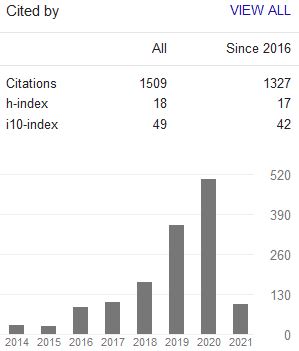FOR THE SAKE OF PROTECTING RELIGION: Apostasy and its Judicial Impact on Muslim’s Marital Life in Indonesia
Abstract
Keywords
Full Text:
PDFReferences
Afandi, Muhrisun. ‘Apostasy as Gounds in Divorce Cases and Child Custody Disputes in Indonesia.’ in Noorhaidi Hasan and Fritz Schuze (eds.). Indonesian and German Views on the Islamic Legal Discourse on Gender and Civil Rights. Germany: Hobert & Co, Gottingeng, 2015.
al-Jaziri, ‘Abd al-Rahman. Fiqh ala madhahib al-arba‘ah. Beirut: Dar al-Fikr, 1996.
Al Na’im, Abdullahi Ahmed. ‘The Islamic Law of Apostasy and Its Modern Applicability: The Case from Sudan.’ Religion, 16 (1986).
Arto, Mukti. Praktek Perkara Perdata pada Pengadilan Agama. Yogyakarta: Pustaka Pelajar, 1996.
Ayoub, Mahmoud. “Religious Freedom and the Law of Apostasy in Islam,” Islamochristiana, 20 (1994).
Bin Sulong, Jasni. ‘The Impilcation of Religious Conversions toward Muslims’ Inheritance under Malaysian Law.’ in International Journal of Liberal Arts and Social Sciences. 2, 9 (2014).
Bassam. ‘Islamic Law/Shari’a, Human Rights, Universal Morality and International Relations.’ Human Rights Quarterly, 16, 2 (May, 1994).
Boussiakou, Iris. ‘Religious Freedom and Minority Rights in Greece: the case of the Muslim minority in western Thrace.’ GreeSE Paper No 21, Hellenic Observatory Papers on Greece and Southeast Europe. December 2008.
Cook, David. “Apostasy from Islam: A Historical Perspective.” JSAI, 31 (2006).
Crouch, Melissa. Law and Religion: Conflict and the Court in Indonesia. London and New York: Routledge, 2014.
Fachruddin. ‘Murtad sebagai Alasan Perceraian dan Implementasiya di Pengadilan Agama.’ in Mimbar Hukum, 39, 9 (1998).
Freedom House, Policing Belief: The Impact of Blasphemy Laws on Human Rights. A Freedom House Special Report, October 2010.
Friedmann, Yohanan. Tolerance and Coercion in Islam. Cambridge: Cambridge University Press, 2003.
Hotnida, Siti, and Dewi Sukarti. ‘Law in Action: Analisis Implementasi UU No. 23 Tahun 2002 pada Putusan Hakim dalam Perkara Hadhanah di Pengadilan Agama.’ Jurnal Alqalam: Jurnal Keagamaan dan Kemasyarakatan (Lemlit IAIN Sultan Maulana Hasanuddin Banten 2010) Vol. 27, No. 2.
Hursh, John. ‘Advancing Women‘s Rights through Islamic Law: The Example of Morocco.’ Berkeley Journal of Gender Law and Justice, 22 June 2012.
Kamali, Mohammad Hashim. Freedom of Expression in Islam. Cambridge: Islamic Texts Society, 1997.
Laskowska, Natalia. ‘Apostasy as a Tool to Suppress Dissent: Indonesian Perspective.’ in Orientalist, 2 (2012).
Lindsey, Tim and Helen Paushacker. Religion, Intolerance and Democratic Institutions in Indonesia. Routledge: Routledge Press, 2016.
Lukito, Ratno. Hukum Sakral dan Hukum Sekuler: Studi tentang Konflik dan Resolusi dalam Sistem Hukum Indonesia. Jakarta: Alvabet, 2008.
----------. ‘The Enigma of Legal Pluralism in Indonesian Islam: The Case of Interfaith Marriage.’ Journal of Islamic Law and Culture, Vol. 10, No. 2 (2008).
Mughniyah, Muhammad Jawad. Fiqh al-Imam Ja’far al-Sadiq. Iran: Dar al Ihtisham, 1979.
M. Zwemer, Samuel. The Law of Apostasy in Islam, www.muhammadanism.org., February 2, 2004.
Nurlaelawati, Euis. Modernization, Tradition and Identity: The Kompilasi Hukum Islam and Legal Practices of the Indonesian Islamic Court. Amsetradam: Amsterdam University Press, 2010.
----------. ‘Muslim Women in Indonesian Religious Court: Reforms, Strategies and Pronouncement of Divorce.’ Journal of Islamic Law and Society, Vol. 20, 3 (2013).
----------, and Muhrisun Afandi. ‘Islam and Children’s Right: The Implementation of the Best Interst of the Child in Indonesia and Morocco.’ A Research Report. The Minsitry of Religious Affairs, Jakarta, 2016.
----------. ‘Sharia-based Laws in Indonesia: The Legal Position of Women and Children.’ in Kees van Dijk. Regime, Change, and Democracy: The Case of Indonesia. Leiden: Leiden University Press, 2015.
----------. ‘The Legal Fate of Muslim Women in Indonesia: Divorce and Child Custody.’ in Tim Lindsey and Helen Paushacker. Law, Religion, and Intolerance in Indonesia. Routledge: Routledge Press, 2016.
Otto, Jan Michiel. Sharia Incorporated. Leiden: Leiden University Press, 2010.
Peters and Devries. ‘Apostasy in Islam.’ Die Welts des Islams. 1 at 5 etseq (1976).
Patricia Michelle Eng Hui Yapa and Boon Huat Tanb. ‘Families Experience of Harmony and Disharmony in Systemic Psychotherapy and Its Effects on Family Life. Journal of Family Theraphy. 33, 3 (2011).
Pijfer, C.F. Fragmenta Islamica, Studien over Het islamisme in Nederlandsch-Indie. Leiden: E.J. Brill, 1934.
Powers, David S. Studies on the Quran and Hadith: The Formation of the Islamic Law of Inheritnace. London: University of California Press, 1979.
Saeed, Abdullah and Hassan Saeed. Freedom of Religion, Apostasy and Islam. Michigan: Ashgate Publishing, 2004.
Sabiq, Sayyid. Fiqh al-Sunnah. Beirut: Dar al-Fathi, 1990.
Tucker, Judith. Women, Family, and Gender in Islamic Law. Cambridge: Cambridge University Press, 2008.
Wahbah Zuhayly. al-Fiqh al-Islāmiy wa Adillatuhu. Damaskus: Dar al-Fikr, 1984.
Welchman, Lynn. Women and Muslim Family Laws in Arab States: A Comparative Overview of Textual Development and Advocacy. Amsterdam: Amsterdam University Press, 2007.
Zahrah, Abu. al-Ahwāl al-Syakhsiyyah. Egypt: Dar al-Fikr, 1957.
DOI: 10.15642/JIIS.2016.10.1.89-112
Refbacks
- There are currently no refbacks.
Indexed by:
Journal of Indonesian Islam (ISSN 1978-6301 and E-ISSN 2355-6994) is published by the Postgraduate Program (PPs) and the Institute for the Study of Religion and Society (LSAS), State Islamic University (UIN) of Sunan Ampel Surabaya.
Journal of Indonesian Islam by http://jiis.uinsby.ac.id/index.php/JIIs/index is licensed under a Creative Commons Attribution-ShareAlike 4.0 International License.
Copyright ©2020 State Islamic University (UIN) of Sunan Ampel Surabaya. Powered by Public Knowledge Project OJS.







